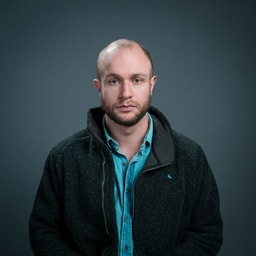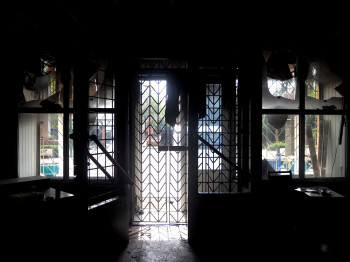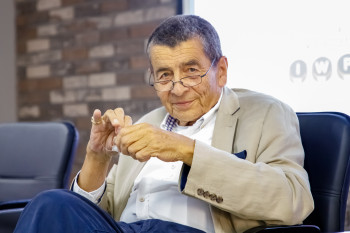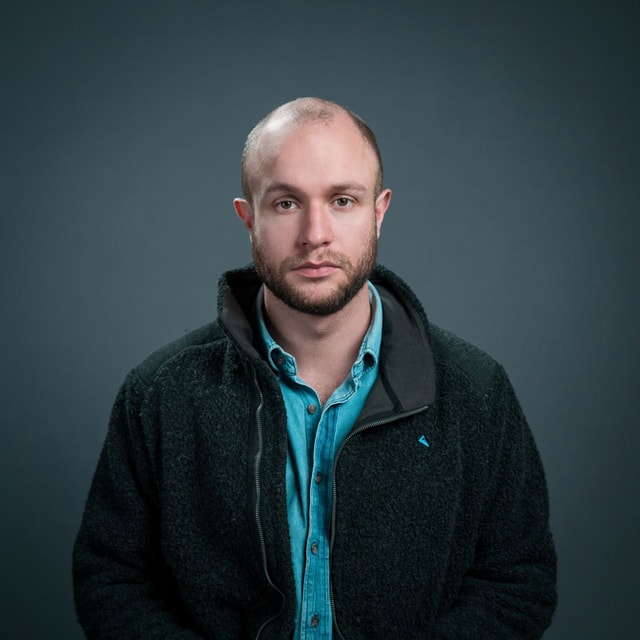Departing EU diplomat: Civilian casualties in Ukraine may be 3 times higher than UN estimates

From the indiscriminate killings of civilians in Bucha, Izium and Mariupol, to the everyday terror of long-range missile strikes, Russia’s full-scale invasion of Ukraine has shocked the world in its devastation and brutality. Behind the tragic headlines, Ukrainian state institutions are faced with the mammoth task of documenting and investigating thousands of cases of potential war crimes.
In this effort, crucial assistance is given by Ukraine’s international partners, one of the most prominent of which is the European Union Advisory Mission to Ukraine (EUAM), a field mission present in Ukraine since 2014.
Before the full-scale invasion, the EUAM worked closely with Ukrainian police and prosecutors to build public trust. After the first Russian atrocities committed in Kyiv Oblast came to light in April, the EUAM built on this relationship to quickly transition to assisting Ukrainian institutions with investigating war crimes, bringing in over 20 foreign experts to advise and teach best international practices.
Fredrik Wesslau is a Swedish diplomat completing his posting as Deputy Head of the Mission at the EUAM after 4.5 years working in Ukraine.
In this interview with the Kyiv Independent a few days before departing Ukraine, Wesslau speaks about the war crimes investigation process from the inside, and about the recent EU initiative to establish a special international tribunal for the crime of aggression, reserved for the key Russian political elite in charge of launching the invasion.
The Kyiv Independent: You have worked for years with Ukrainian police and prosecutors. How did you observe that transition in both their work and yours, transforming from their pre-war jobs into war crimes investigators?
Fredrik Wesslau: I was personally quite engaged with this topic because I've worked previously in the Balkans, Sudan and South Sudan, and Georgia as well in 2008. The fact that we were on the ground as well and that we have had these very long-standing relations with the Prosecutor General’s Office, the police and the Security Service of Ukraine (SBU) meant that they knew us and they trusted us so we could quite easily shift from normal reform activities to this focus on helping them on war crimes. By this I mean war crimes in a broad sense, crimes against humanity, genocide, and also the crime of aggression. I think the big challenge is that the scale is just so enormous. I mean, the Prosecutor General’s Office has now registered over 50,000 individual cases and this number will just increase as more territory is liberated, as more atrocities are uncovered. The law enforcement agencies are completely focused on this, and they have dedicated massive resources to it. Any country facing this would be under tremendous strain because it's a very particular form of work. This is also our role as well to help them transition quickly, to be able to understand how to deal with crime scenes from missile strikes, mass graves, or torture chambers, and then also to help them develop their understanding of international humanitarian law as well.
The Kyiv Independent: Can you take our readers through the basics, the everyday work of how a certain given case would be addressed? Is it by chance that one case is handled by the prosecutors, one by the SBU, one by the police? How does the coordination work, how does all the data get collected and organized?
Fredrik Wesslau: The Prosecutor General’s Office has the lead in terms of coordinating this work, and the SBU has jurisdiction over international crimes, war crimes. But in practice it's often the police who were on the scene first and then carry out much of the investigations. As for the types of crimes, there are a few different categories. One is the missile and drone strikes, the indiscriminate targeting or perhaps even deliberate targeting of civilian targets, hitting critical infrastructure, which is an explicit objective by the Russian Federation.
But then also you have everything happening in the occupied areas, which also varies a lot. We’ve seen, torture, we've seen executions, we’ve seen mass graves. We've also seen the forced displacement of people, including children. I think this is probably the thing which has affected me personally the most. There are no words to describe it, really, but it is such an outrageous act in a way, to steal children from Ukraine like this.
The Kyiv Independent: What new trends and tendencies did you see in your work? What, for example, have you noticed in the Kherson Oblast compared to Kharkiv Oblast or other areas that weren't occupied for so long?
Fredrik Wesslau: A really horrifying aspect is how the Russian forces and occupation authorities have sort of learnt from the past few months. In Kherson what we've seen is that a lot of the evidence of war crimes has been taken away or booby trapped – there have even been cases of dead Russian soldiers who have been booby trapped by their colleagues. I think another important aspect as well is how Ukrainian authorities and especially law enforcement agencies deal with these newly liberated areas because there are vast challenges. There's everything from the physical destruction of homes and critical infrastructure to the war crimes, and cases of collusion as well. How do you deal with that in a way which doesn't create further tensions in society? I think there's a big difference between the person who was basically a Russian agent who then worked in the local council under Russian control and the babushka who might have been making borshch for four Russian soldiers.
The Kyiv Independent: Sometimes, allegations also come up of potential war crimes on the Ukrainian side, most often regarding prisoners of war. Since I imagine your work is more independent from the Ukrainian agencies, can you tell us about how these cases are investigated?
Fredrik Wesslau: I think this is an extremely important point to make as well, that investigating war crimes has no nationality. It doesn't matter if the alleged perpetrator is Russian or Ukrainian, a war crime is a war crime. But from what we see, the Ukrainian law enforcement agencies are taking this seriously. The fact that you have Russian troops on Ukrainian soil and the way that the Russians are fighting this war invariably entails that the vast majority of war crimes are being committed by Russian forces.
But we have seen instances as well where Ukrainian forces have possibly done things as well. I think that the Ukrainians really understand the need to deal with war crimes being committed by their own soldiers as well, as there is also a credibility issue here, which is very important. And it's also about not feeding the Russian propaganda machine as well, so it's a very delicate issue overall.
The Kyiv Independent: Having had an office in Mariupol, what can you tell us about the general picture of the city? What is it like investigating war crimes in a place like Mariupol, especially when it is still occupied?
Fredrik Wesslau: I've been to Mariupol many, many times, and I met with many colleagues there from the police, from other law enforcement agencies, many of whom were in Azovstal and were taken to Russia, with some later freed. But what's happened there is just absolutely shocking, it's beyond belief somehow also, especially what happened with the bombing of the theater. Of course, Ukrainian and international investigators don't have access to Mariupol, but there is still quite a bit that can be done. Many are looking at the crimes being committed through open-source intelligence, and also interviewing people who managed to escape and so on.
The Kyiv Independent: Before we do find out more and we go through all these mass graves and all the testimonies, do we already know that there could be lots of situations of mass executions, similar to what we saw in Bucha?
Fredrik Wesslau: These investigations are ongoing, but I think that the scale of the report would just be enormous. It's just a tragedy on a different level. People talk about these UN figures, estimates for civilian casualties, of course, the actual figure is much, much higher, probably three times as much. In the end, it becomes a bit problematic referring to these official figures.
The Kyiv Independent: We have heard a lot recently about the European Union efforts to establish a dedicated tribunal for Russian war crimes, what role do you think this will play in the overall process?
Fredrik Wesslau: We have the Ukrainian courts and the law enforcement agencies, as well as the International Criminal Court (ICC) and the member states who have their own individual investigations ongoing. But there is a distinct accountability gap when it comes to the crime of aggression. There's currently no court that really has jurisdiction over the crime of aggression, which is specifically about the leadership. This is the mother of all crimes, which is, without which, the other crimes wouldn't have happened. This is why Kyiv has been pushing for the establishment of a special tribunal or some sort of mechanism that would deal with the crime of aggression.
The president of the European Commission, (Ursula) von der Leyen, confirmed that the EU was supporting such a mechanism. I think this is extremely important because it's one thing to go after the foot soldiers and maybe their commanders, but if you don't go after the instigators of this war, you can never really speak about full accountability. This is extremely important, not only for Ukraine and Ukrainians and their sense of justice, but also from the point of view of the international order and the norms-based international order. We want a world where the crime of aggression is actually punished, because otherwise the whole system breaks down and the whole U.N. Charter becomes watered down.
The Kyiv Independent: What might such a tribunal look like in the future? What does it mean for the EU, specifically in the ICC, to cooperate in this matter, will it be similar to the tribunal for the former Yugoslavia?
Fredrik Wesslau: There are different options and different views, but I think it's really important that it has a broad base in terms of support and that many states support this, because this is really about the legitimacy of the tribunal. It's also important that it has a very focused mandate, there shouldn't be an overlap with the ICC, or courts in Ukraine, but that it fills this gap because the ICC can't prosecute the crime of aggression in this particular case. Ukrainians tell me that it doesn't need to be a very big court, it can be a fairly slim operation as well, because it would potentially deal with only one crime and a handful of individuals, and the crime of aggression is, in my view, pretty easy to prove.
The Kyiv Independent: And what's your personal understanding of the guilt that lies there? Many would argue that it was one person's decision only. Are we only talking about this political inner circle, what about propagandists?
Fredrik Wesslau: Typically for the crime of aggression, it's a very small group, the inner core in a sense. This is about the closest people who are part of planning, preparing, instigating, and launching the aggression. I think with the propagandists, it does fall a little bit outside the remit of crime of aggression in the sense. But there is more and more discussion amongst legal scholars about accountability for the propagandists, since, for instance on Russian state TV, you see quite hardcore propaganda, the inciting of violence of the most horrible kind. The question is, what is their role in this war effort, how do they influence the war and how are they culpable in all of this?
The Kyiv Independent: It's all well and good to have a court remotely convict people, but do you think it's at all possible that Russia, as a country and as a society, will come to terms with its crimes in a way that these people could be held accountable in person?
Fredrik Wesslau: It’s a highly relevant question. The future is very unpredictable. When the tribunal for Yugoslavia was set up, who would have imagined that Milosevic would be extradited to The Hague and appear in court? Changes in Russia could entail that the court actually does get custody at some point over them as well. In the last nine months, things which seemed completely impossible yesterday, seem sort of possible today, and could be highly likely tomorrow.
But yes, it’s more a question of are those changes inside or so possible on the societal level. When you speak to Ukrainians, they're very focused on the idea of a tribunal, and I think it would be a recognition that the crime has happened, and then indictments could be issued. That in itself would really set the historical record, and if followed by arrest warrants, that would have an impact on how these people are able to travel and so on.
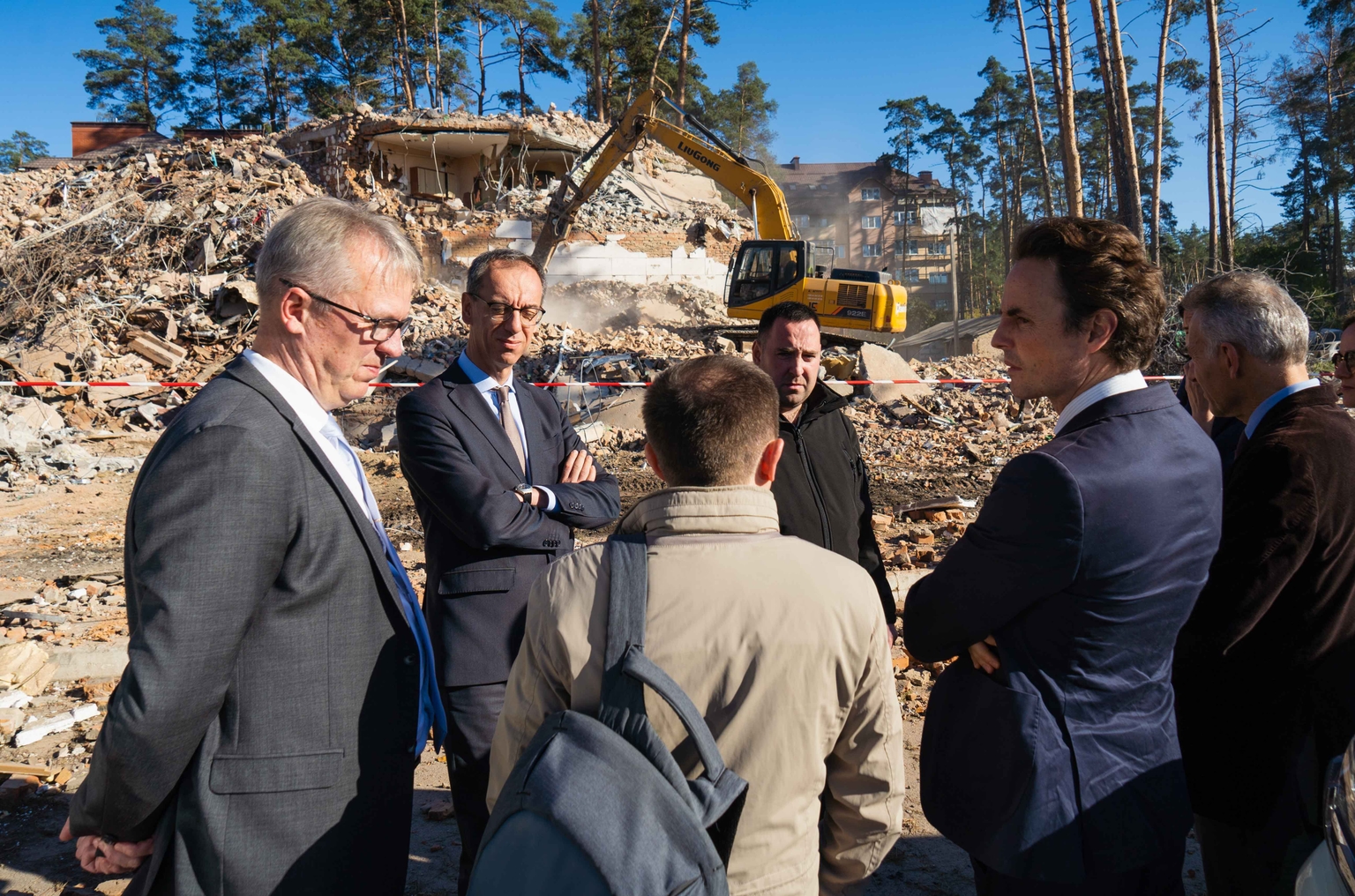
The Kyiv Independent: On a personal level, as someone who's right in the middle of it, how would you assess the response of Europe to the war? What still needs to be done in terms of decisions made, on the EU level but also by individual countries?
Fredrik Wesslau: I think the EU has done a tremendous amount to support Ukraine and continues to do so. I mean, everything from weapons, the EU as an institution has paid €3.1 billion for weapons in addition to what individual member states are doing. There's also the macro financial support, and the humanitarian assistance as well, which the EU is paying for. Then of course is the fact that the European Council gave Ukraine candidacy status as well in June this year. This is such an enormously strong political signal. It's such a repudiation of Moscow's political ambitions in Ukraine and just a massive confirmation from the EU’s side that Ukraine belongs in Europe.
On a personal level, I wish we would do more. I think this is really a war which somehow will define Europe, the EU for the next hundred years, and then also our role in the world.
Still, we really must step up and help Ukraine with more money, more weapons, more support, more humanitarian support, because at the end of the day, Ukraine is not only fighting for its own existence as a nation, it's also fighting for Europe. This war is completely black and white. From the inside, everyone is saying that the EU will stick with Ukraine for as long as it takes, and I think this is true.
The Kyiv Independent: But on the level of member states, do you feel personally that there's a worry that Ukraine fatigue is starting to set in and there's a reluctance to continue that level of support?
Fredrik Wesslau: I think the talk of Ukraine fatigue is a bit exaggerated. Obviously, member states have different views about everything, but overall, the understanding of the strategic significance of this war and the importance of Ukraine winning is very strong. I think what Russia is trying to do now by attacking energy infrastructure is to create another exodus of Ukrainians into the EU and to divide and put pressure on the EU. But I don't think this is going to work. I think the solidarity in the EU is so strong both at a government level but also a societal level. What Russia is trying to do is futile, counterproductive and will ultimately fail.
Note from the author:
Hi, this is Francis Farrell, cheers for reading this article. I grew up on the other side of the world, but in Ukraine I have found a home unlike any other. Just like with so many of our readers, I understand that you don't have to be from near here to realize how important Ukraine's struggle is for freedom and human rights all over the world. The Kyiv Independent's mission is to lead the way in continuing to bring the best homegrown, English-language coverage of this war, even if the rest of the world's attention starts to fade. Please consider supporting our reporting.
